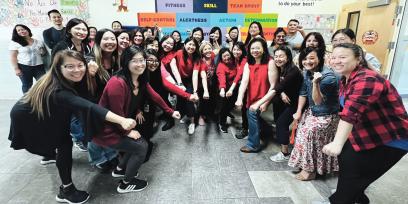Being on the bargaining team is challenging, but it’s transformative. You learn your power as a worker. You may hear, “It’s an old system, they’re not going to do anything. Nothing’s going to change.” But the systems will change when members are engaged and know their power. It’s not going to be right away. It’s going to be little steps at a time—but those steps will be cumulative. Throughout bargaining, we proved management wrong. We got involved, we got our students’ families involved, we got our community involved, so management had to listen.
I started my career in banking and management. Once I had my second child, I stopped working, but then he was diagnosed with a speech impairment. That was really hard as a parent—I felt like I missed something. Having him evaluated at two years old and finding services was hard. But seeing how impactful it was for him to get services so early put me on the path to my current role as a speech-language pathologist.
When I started, like any educator, I experienced a huge learning curve. It was tough the first two years due to the high caseload and high needs of the students. The third year, I transferred to the elementary school that I first attended as a child. I emigrated from China at five years old, and in this community, 90 percent of the children also have parents from China. It’s so meaningful to be servicing my community. I speak Cantonese and Toisanese Chinese, so that’s part of my power.
Several years ago, I was elected as a Union Building Committee representative for the speech-language pathologists. Along with three other reps, we had many meetings with our supervisor about the pandemic challenges. Given those challenges and also rising racism impacting our community, getting support for our students was even more urgent—and I wanted to do more. I was elected to represent the speech-language pathologists on the bargaining team, focusing on the challenges we have and how we can better support our students.
My goals were to present how extensive the responsibilities are for speech-language pathologists and to use a workload model versus a caseload model to better support our students. Caseload is just counting the numbers of students we have; workload encompasses all the things that we do for our students, including consulting with and training all stakeholders as needed; providing direct services, assessments, and screenings; and making sure that we’re not over- or under-evaluating the students. After working with other special educators in writing the proposals to address these goals, it was evident that all special educators would benefit from using the workload model.
As a member of this big bargaining team, it’s electrifying to stand together for all the different issues that we have to address. Each site has communities with different needs. It’s time-consuming, but being on the bargaining team is worthwhile because of my own experiences as a child and advocating for my son. It’s also worthwhile because I know so many of our speech-language pathologists are burned out. Crucially, I’m not doing this alone. When you’re in your own classroom or office, you’re in a silo. But when you step into bargaining and organizing, there are other people behind and with you, empowering you and them to push ahead and make changes.
Our approach to bargaining is very inclusive and systematic. At first I wondered how 70 people would be able to agree when we’re bargaining, but bringing in people from all of the sites to give their input and agree on what we would fight for was really important. Having gone through the election to become a bargaining team member, then the orientation, I learned a lot about how we came to agree on our team discipline. We each participated in the campaign kickoff, then signed a discipline agreement that set out our principles. Throughout bargaining, we had rallies and other actions, petitions, town halls, and check-ins to see which sites needed more support. Week by week we saw our member engagement increasing—and that’s how we won a historic contract.
The one thing I’d say to my fellow union members based on my experience is lean into your power. And if you have a skill or a certain passion, use it. We need everyone to use their power to make change. I’m an introvert, so having hard one-on-one conversations and speaking in front of big groups are nerve-racking for me. But I’m doing it. By being on this bargaining team, I know my power more. I hope each of you will rise to your power and steer it to the change that benefits your students, educators, and families.
–Tina Leung, bilingual speech-language pathologist and member of UESF’s bargaining team
[photo: Courtesy of United Educators of San Francisco]

